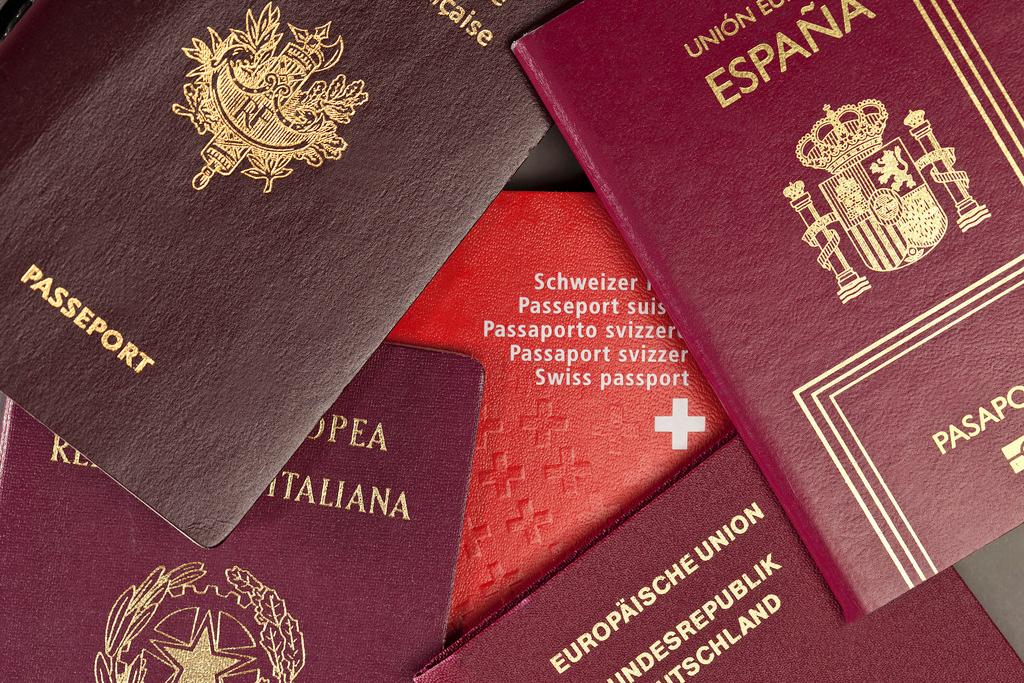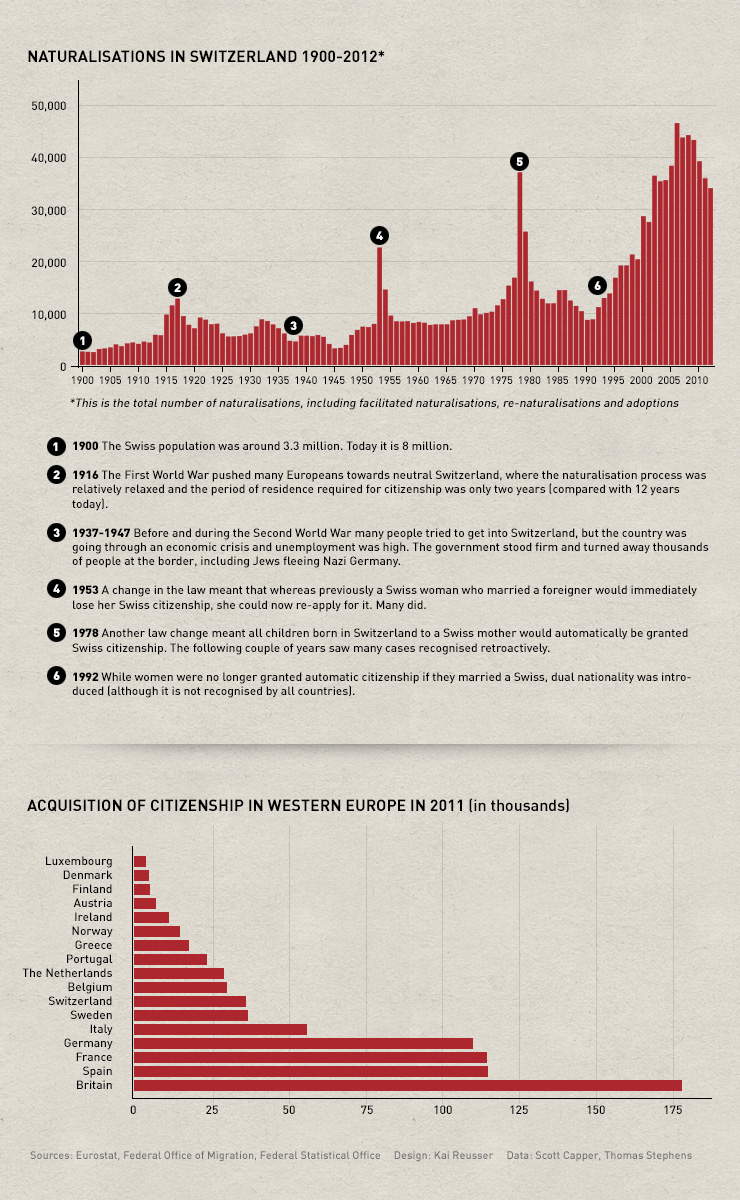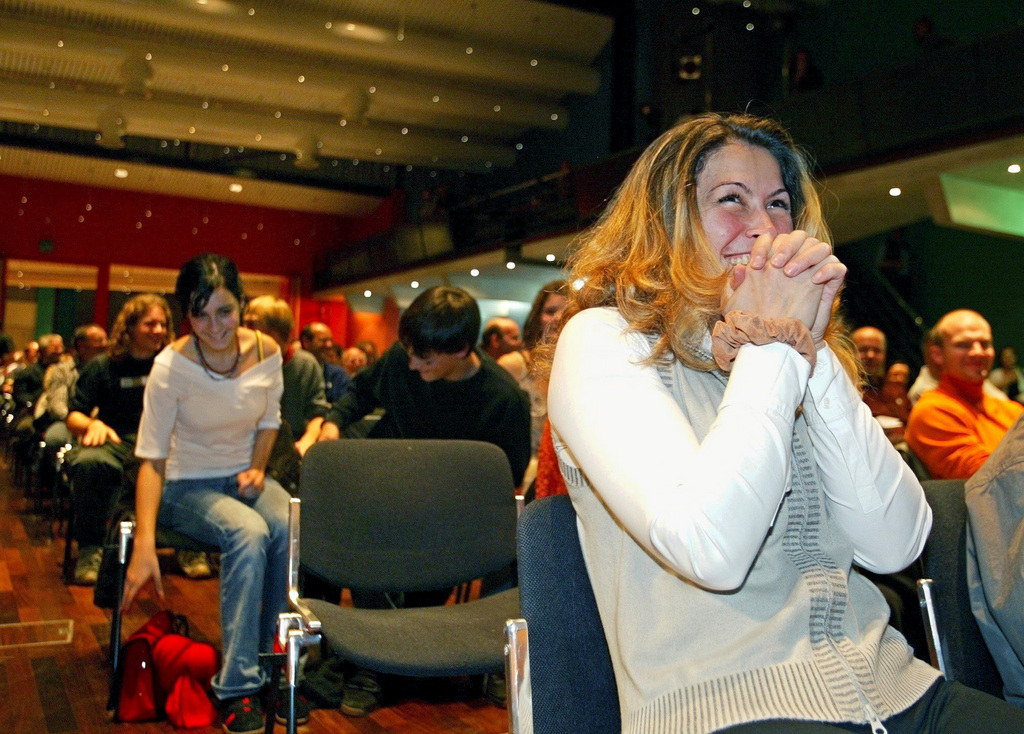Facilitated naturalisation, a bitter pill?

Facilitated naturalisation for spouses of Swiss nationals used to be seen as the easy route to citizenship. However the integration assessment has become an onerous and intrusive procedure for some, with significant disparity in how the local authorities deal with applicants.
Some 8,000 Swiss residents per year are naturalised through the facilitated procedure, accounting for a quarter of all naturalisations. swissinfo.ch spoke to several applicants, two of whom are still awaiting a decision. The sample, though not representative, shows a system lacking in fairness and consistency.
Some, like Kularp Saipopoo from Thailand, resident in a village in canton Bern since 2009, found the process speedy and straightforward. “My interview lasted around a half an hour and they were so nice. The policeman just wanted to know how my husband and I met and what I was doing here in Switzerland.” Saipopoo’s application was completed within seven months in 2014.
Janet Wertli, a British national living in small commuter town in canton Aargau for the past two years, after stints in the United States and Asia, had a similar experience. She got her Swiss passport just before Christmas 2014, five months after applying. Like Saipopoo, Wertli was not questioned on her knowledge of Swiss politics or culture. Her interview lasted a few minutes.
“It’s a small place and we know the people in the commune office. Our landlord wrote a recommendation and I also send in a compilation of photographs that illustrated our close connection to Switzerland over the years,” she told swissinfo.ch.
‘Is your wife a prostitute?’
Others, like Carlos (not his real name), an applicant from Latin America who has been married to a Swiss woman for four years, have found the procedure opaque and intrusive. Carlos lives in an urban part of Bern and did not want his real name or country of origin to be used in this article while his application was still in progress.
He was not at home when the police visited his apartment unannounced in December 2014, and he later attended his local commune office for an interview. Carlos was shocked at the first question put to him by the policewoman: ‘Is your wife a prostitute?’
“I couldn’t believe what I was hearing. The police officer was typing everything into her computer. She said sorry, it’s just the questions on the form, but I haven’t heard of anyone else being asked this. Also I thought they must have had all the information about us from the documents I sent in. They knew where my wife works.”
“I’ve lived in Switzerland for eight years and been married for four. We don’t have any children yet, because I was retraining and wanted to get qualified first. I think this was what made them suspicious and that was their main focus in the interview,” Carlos said.
The State Secretariat for Migration sets the criteria but the decision on whether to grant citizenship is based on the report on the applicant written up by the cantons. Some cantons delegate this task to the communes and different cantons and communes are carrying out this duty with varying degrees of zeal.
According to the State Secretariat, the federal authorities make a sample form available to the cantons for the report. “The cantons are free to use or amend these questions at their own discretion. There is no standardised catalogue of questions,” the secretariat confirmed to swissinfo.ch by email.
‘Really stressful’
A European Union citizen, Gabrielle (does not wish to reveal her name or nationality) speaks two Swiss national languages fluently and has always been employed in Switzerland. She says she loves the country. Now, 15 months after she submitted her application, she is sorry she ever applied for naturalisation.
At the beginning of this year Gabrielle was called for an interview at her cantonal immigration office in western Switzerland.
After nearly 20 years living and working in the canton and with three Swiss-born children, Gabrielle hoped her facilitated naturalisation interview would be a mere formality. Instead she found it “really stressful”.
“The interview went on for an hour and a half and it was extremely intrusive. All these questions about my marriage, family and lifestyle; it was more like an interview checking for a fake marriage. The interviewer also made a point of adding up the months to show that she knew our first child was conceived before we got married.”
“The Swiss general knowledge questions were fine but when she got into the detail of local politics, and names of politicians I got all mixed up. I found it really stressful.” Ultimately Gabrielle’s application was suspended because of an unpaid tax bill.
The questions on political and general knowledge are likely to become standard since parliament voted in June 2014 to raise the bar for facilitated naturalisation, introducing the condition that applicants must meet the same integration requirements as everyone else. New guidelines are currently being drafted.
Mixed marriages
There is an ever-increasing pool of potential candidates for facilitated naturalisation. More than one in three marriages in Switzerland is of mixed nationality – Swiss and foreignExternal link. In 2014 a total of 15,706 Swiss citizens married foreigners in Switzerland out of a total of 41,223 marriages.
Sociologist Gianni D’Amato of the Swiss Forum for Migration and Population Studies at the University of Neuchâtel says that those eligible for facilitated naturalisation are still the privileged ones, as they only have to meet the requirements of the confederation, not the cantons and the communes.
“Nevertheless you may have tricky questions. They will refer to your language knowledge, your civic knowledge, your financial situation. They will refer to everything and if you don’t want to be scrutinised like this, you have to have settle for status as quasi-citizen, with a permanent residence permit.”
When the issue of introducing integration requirements for facilitated naturalisation candidates was debated in 2013 and 2014, the cabinet only wanted the integration criteria to be examined. If the same criteria were applied as for ordinary naturalisation, then the procedure could hardly be called facilitated any more, Justice Minister Simonetta Sommaruga argued.
This didn’t convince parliament, and the Senate followed the House of Representatives in voting to raise the bar for facilitated naturalisation by applying the same integration requirements as exist for ordinary naturalisation.
‘For love of Switzerland’
The centre-right Radical Party, one of whose members proposed this reform, explained the rationale behind the change in an impassioned statementExternal link issued on the eve of the House of Representatives vote.
“For naturalisation, demonstrable efforts to integrate are essential: Knowledge of the Swiss lifestyle, of at least one national language, as well as a proven, successful integration into our society.”
“We see integration as a core task of the state based on the principle ‘Demand and encourage’. The party showed its will today on this issue and is also committed to a hard and fair policy on foreigners in the future – for love of Switzerland.”
The ordinary naturalisation procedure has earned a reputation for being expensive, demanding and even capricious in some cases. Last October, a retired American professor (see video below) who has lived in Switzerland for more than 40 years and raised his family here had his application rejected by his local commune Einsiedeln on the grounds of not being integrated enough.
“Fewer of the eligible ones are applying because the whole communication is that ordinary naturalisation is tough and hard and for that reason many people are put off attempting the procedure,” D’Amato said.
Integration
Integration is a non-legal term measured using a broad range of criteria. The naturalisation decision is based on an overall assessment of the individual case, according to the State Secretariat for Migration. The applicants are required to:
Respect the basic principles of the Constitution.
Observe the law (any past or outstanding prosecutions, criminal or for debts, will prevent naturalisation)
Take part in the social life of the community
Have sufficient language skills (A2/B1)
Be professionally integrated (ie. employed or studying)
Be knowledgeable about the Swiss political system, Swiss culture and traditions.
The cantons can also require that the applicant is self-sufficient, ie. not dependent on social welfare
Facilitated naturalisation benefits foreign spouses of Swiss nationals and children of a Swiss parent who do not yet hold Swiss nationality. A 2012 study commissioned by the Federal Commission on Migration found that in 2010 around 900,000 people were eligible for citizenship. In total 36,000 people were granted Swiss citizenship in 2011.

In compliance with the JTI standards
More: SWI swissinfo.ch certified by the Journalism Trust Initiative














You can find an overview of ongoing debates with our journalists here . Please join us!
If you want to start a conversation about a topic raised in this article or want to report factual errors, email us at english@swissinfo.ch.